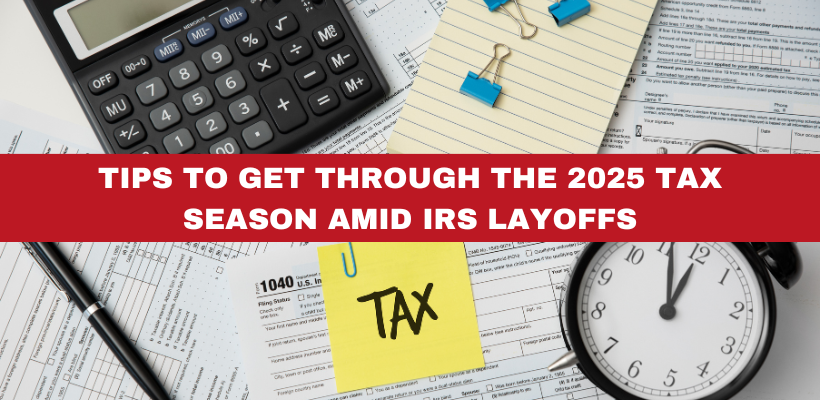With the IRS expected to lay off thousands of employees, the 2025 tax season is shaping up to be a challenging one for both taxpayers and the agency. These workforce reductions may lead to processing delays, longer wait times for assistance, and slower audit resolutions. If you’re concerned about filing your taxes this year, preparation is key. Below are some tips you can take to navigate this tax season as smoothly as possible.
1. File your tax return electronically.
Submitting your tax return electronically is the fastest and most reliable way to ensure it reaches the IRS. With staffing shortages, paper returns may take significantly longer to process, increasing the risk of delays in receiving your refund or resolving tax issues. E-filing also reduces errors and provides confirmation that your return has been received.
2. Opt for direct deposit.
If you expect a refund, choose direct deposit instead of waiting for a paper check. This method is not only more secure but also ensures that you receive your funds more quickly. Given the expected delays in IRS operations, direct deposit can help you avoid unnecessary waiting periods.
3. Double-check your tax return for accuracy.
With fewer IRS employees available to resolve errors or discrepancies, submitting an accurate return is more important than ever. Mistakes can lead to processing delays or IRS inquiries that take longer to resolve. Review all figures, ensure your personal details are correct, and use tax software or professional assistance if needed.
4. Keep records of your tax documents.
Having well-organized records can help if you need to respond to IRS inquiries or resolve disputes. Keep copies of your W-2s, 1099s, deduction receipts, and any IRS correspondence to avoid potential delays in the event of an audit or verification request.
5. Monitor your IRS account and refund status.
With processing delays likely, staying informed about your tax return status can help you anticipate any issues. Use the IRS’s “Where’s My Refund?” tool or create an online IRS account to check for updates and correspondence.
6. Be prepared for longer wait times for IRS assistance.
If you need to contact the IRS for help, expect delays in reaching a representative. Consider using online tools, FAQs, and resources available on the IRS website to find answers before calling. If you must speak with an agent, try calling early in the morning or late in the day to avoid peak hours.
7. Be cautious of tax scams.
With IRS delays and uncertainty, scammers may try to take advantage of taxpayers through fraudulent emails, phone calls, or text messages. Remember that the IRS does not initiate contact via email or phone regarding tax payments. Always verify IRS communications by checking your IRS account online or contacting the agency directly.
Final Thoughts
The 2025 tax season brings a level of uncertainty for taxpayers due to the massive reduction in the workforce. Despite that, being proactive can help you avoid potential delays and headaches. You may choose to file electronically, opt for direct deposit to receive your refunds, and more importantly, make sure your return is accurate. Staying informed and keeping track of IRS updates are also key to getting through any unexpected challenges. While this tax season may be difficult to predict now, a little preparation can help you survive this 2025 tax season smoothly and avoid unnecessary headaches.







 Steven N. Klitzner, P.A. is a tax attorney based in Miami, Florida. He has been practicing tax law for over 40 years, and currently holds a 10.0 rating by Avvo. Mr. Klitzner was appointed to the IRS Service Advisory Council in 2021 and is...
Steven N. Klitzner, P.A. is a tax attorney based in Miami, Florida. He has been practicing tax law for over 40 years, and currently holds a 10.0 rating by Avvo. Mr. Klitzner was appointed to the IRS Service Advisory Council in 2021 and is... 





